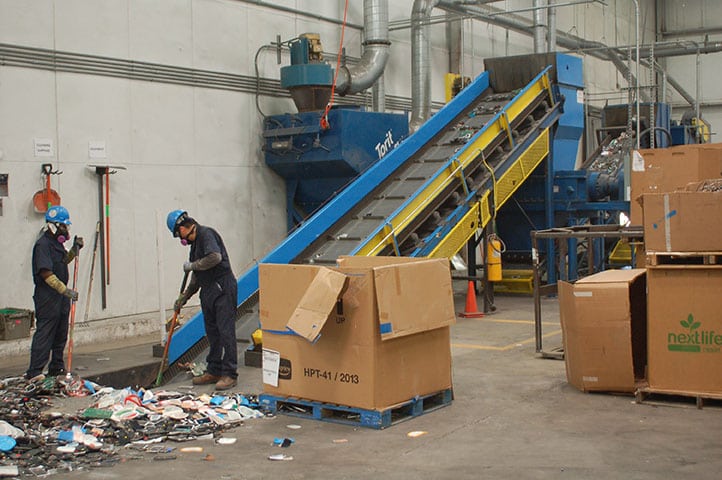Workers at the Mesquite, Texas ECS Refining facility. E-Scrap News file photo.
This story has been updated.
A national e-scrap processor that previously filed for Chapter 11 bankruptcy will see its assets sold and over 300 jobs terminated under a plan recently approved by a federal judge.
U.S. Bankruptcy Court Judge Robert Bardwil on July 2 signed an order formally authorizing a bankruptcy trustee to spend the cash necessary to shutter ECS Refining. The trustee, who has been running the e-scrap company for nearly two months, closed ECS’s doors on June 29 following a verbal decision by the judge hours earlier.
The move came after efforts to sell ECS as an intact company failed. ECS’s largest creditor, SummitBridge National Investments V LLC, told the judge and the trustee it wants to have ECS closed and its assets liquidated. SummitBridge has a secured claim of nearly $26 million, the majority of which is unlikely to be paid back, financial records show.
“Really, at the end of the day, it’s up to the secured creditor whether they’re going to eliminate those jobs or not at this stage and hold an auction for the equipment,” Thomas Willoughby, attorney for the trustee, told the court in a June 29 hearing in Sacramento, Calif.
“We think wind down is appropriate at this point,” Tom Mouzes, an attorney representing SummitBridge, told the judge.
The asset manager for SummitBridge National Investments V is Denver-based Summit Investment Management, which specializes in acquiring distressed debts and providing balance sheet restructures of operating companies, special situation capital, bridge loans and joint ventures.
Nationwide impacts
The move has ramifications across the country. Founded in 1980 by Jim and Ken Taggart as a processor of post-industrial scrap, ECS has provided e-scrap recycling and IT asset disposition services with locations in the California cities of Santa Clara, Santa Fe Springs and Stockton; the Oregon cities of Portland and Medford; Mesquite, Texas; Columbus, Ohio; and Rogers, Arkansas.
Before its closure, ECS employed 341 people across all its locations. It was headquartered in Santa Clara, where it ran a metals refining operation. Its Mesquite and Stockton facilities held R2 certification.
ECS voluntarily filed for Chapter 11 bankruptcy on April 24 in U.S. Bankruptcy Court for the Eastern District of California. At the time, company CEO Jim Taggart said in a statement the move was being made to avoid a forced takeover by SummitBridge, a private equity firm that had purchased millions of dollars of ECS bank debt.
As of mid-June, the trustee estimated ECS had assets worth $7.36 million and liabilities totaling $32.57 million. Those liabilities include the $25.93 million in secured debt owed to SummitBridge. Collateral for SummitBridge’s loan totaled an estimated $6 million. The rest of the claims were for unsecured debts.
ECS has a number of owners, court documents show. In order of largest ownership share to smallest, they are Robert A. Horne and Nicholas Burger, partners in ZS Fund LP of New York City (50 percent); Canadus Technologies of Terrell, Texas (25 percent); All Metals of Palo Alto, Calif. (15 percent); Jim Taggart (5.1 percent); and Ken Taggart (4.9 percent).
As of mid-June, it was estimated ECS had assets worth $7.36 million and liabilities totaling $32.57 million.
Court documents show that at the time of its closing, ECS still had the following customers: AT&T, Bayer Healthcare, Comcast, DWS (Disney), Gilead, Nektar, Olympus America, Republic Services, Samsung, Walmart, California’s Yolo County and Zynga.
The company has also been involved in state recycling programs. For example, ECS received 41 percent of all material collected through Oregon’s program last year, state records show. A state official told the Portland Tribune newspaper that, in the short term, URT Solutions will absorb the weight that would have gone to ECS. A URT official told the newspaper it will add a second shift at its Clackamas, Ore. facility so it can process additional weight. URT already processes a little over 50 percent of the weight collected through the program.
ECS also handled nearly 7 percent of the material processed through Washington state’s program in 2017, according to program records.
Failed sale attempt
On May 8, Judge Bardwil appointed W. Donald Gieseke to serve as trustee for ECS. Gieseke strongly preferred to sell ECS as an intact, operating company, preserving employees’ jobs, Willoughby (his attorney) said at the June 29 hearing.
In the end, one formal bid was submitted to purchase the company. The judge described it as an offer made by company insiders that wasn’t acceptable to Gieseke or SummitBridge.
Willoughby described the offer as “weak,” noting that it would have involved waiving claims against ECS owners.
“Unfortunately, your honor, we received an offer for the company that was not acceptable to SummitBridge in any shape, form. SummitBridge wants to go forward and close the company effective immediately,” Willoughby said during the June 29 hearing.
“The offer that just came in had most of the payments on the backend,” he added. “Really no cash up front for the secured creditor, and the secured creditor is sitting there in first position.”
He told the judge the trustee does not believe it could force a sale over SummitBridge’s objection. Mouzes, the SummitBridge attorney, said ECS was “way upside down.”
“There is no reasonable possibility or reorganization around continuing the recycling business,” SummitBridge’s attorneys wrote in court papers. “According to the Trustee, the Estate has been running losses of between $300,000 to $500,000 per week and has accrued unpaid administrative liability in excess of $2.3 million and the Trustee has shut down the operations of the Debtor.”
During the hearing, the judge said he was approving a plan submitted by the trustee to spend a total of $657,000 of ECS cash to close the company. Most of that money would go to employees’ final paychecks, which were to be issued the first week of July. As of June 15, ECS had an estimated $1.06 million in net book cash available.
In court documents, the trustee noted that income from ECS operations has barely been enough to cover payroll over the past few weeks.
On July 2, Judge Bardwil signed the interim order authorizing “shut down cash distributions.” A final hearing is scheduled for July 17. “Trustee is authorized to take reasonable and necessary steps in his business judgement in the exercise of his role as the liquidating fiduciary for the bankruptcy estate to halt or reduce operations,” according to the order.
Warehouse cleanup costs
Gieseke, the trustee, estimated total environmental costs to remove ECS’s accumulations of e-scrap materials at $1 million. The trustee intends to abandon all property leases as part of the shutdown.
“Right now, we’re looking at something that I think would curl the hair of most environmental lawyers in the state, knowing the amount of waste that’s out there across all these locations,” David Weitman, an attorney for landlord Prologis, told the judge during the June 29 hearing.
Prologis is the landlord for ECS’s Santa Fe Springs, Calif. warehouse. On June 28, Prologis had filed an objection to the trustee’s spending request. Noting that ECS owes Prologis $30,000 in unpaid rent and fees on the property, Prologis asked the judge to authorize Gieseke to use ECS’s cash collateral to pay back rent and material cleanup costs. ECS used that property and others to store e-scrap before shipment to its processing centers, according to the filing.
“This is bad for everyone, your honor,” Weitman said.
Mike Lubic, another attorney for Prologis, said the trustee, in running the business, has been generating new hazardous materials and storing them on the Prologis property. “This is all being done for the benefit of the secured creditor, who appears to be way under water here,” he told the judge during the hearing.
“I’m certainly sympathetic to [the landlords’] situation, but you can’t get blood out of a turnip,” said the judge overseeing the ECS bankruptcy case.
In his July 2 interim order, the judge did not authorize spending for lease payments or cleanup. During the hearing, he said he’s being presented with a “worst-case shutdown scenario.”
“I’m certainly sympathetic to their situation, but you can’t get blood out of a turnip,” Judge Bardwil said.
Weitman and the trustee both noted there are cleanup bonds available to pay for remediation costs. Company asset and liability records show ECS has restricted cash in Bank of America accounts designated for cleanup costs, although the total dollar amount available – and where and how that money can be spent – wasn’t immediately clear.
Weitman asked the trustee to make available information on the bonds and how they can be used. At the end of the hearing, Bardwil said he wants the parties to communicate with each other before the July 17 hearing.
“I’m expecting between now and the time everybody is back in front of me that there’s going to be serious dialogue about what needs to be done to have the most gentle landing under these unfortunate circumstances,” Bardwil said.
This story has been updated with additional information from recently filed court records and a newspaper article.
Want more of our exclusive analysis? Subscribe to the print edition … for free!

























